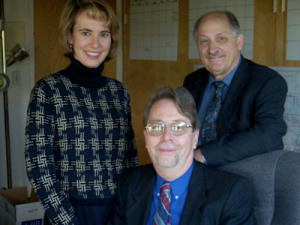Pragmatic Lawmaker
Public Service
“It is not power that corrupts, but fear. Fear of losing power corrupts those who wield it and fear of the scourge of power corrupts those who are subject to it.” – Nobel Laureate Aung Sang Suu Kyi, 1990 – She might reread her own quotes. TD 8 Dec 2017
Partnering with his closest friend and wife of 51 years, Carmen, and many volunteers, Ted was twice elected to the Arizona House of Representatives as a Democrat.
Ted shared governance responsibility with 89 other legislators for preparing a 10.1 US$ budget to serve Arizona’s 6.5M people. 2003-2006. He represented the same Tucson district with then-Senator, former Congresswoman Gabrielle Giffords (~180,000 people). If a senseless tragedy had not happened, she should have been our US Senator – and the country would have had a different history.
A political pragmatist, Ted’s bills focused on election integrity reforms, social justice, increasing financial support for university and community college students, protecting animal rights, improving energy efficiency, and increasing civil liberties. Eighty-six of Ted’s co-sponsored bills became law, an outstanding record for a Democrat in a Republican-controlled legislature. In this era of hyper-partisanship, Democrats normally pass anywhere from a handful to no legislation per session.

The late Senator Andy Nichols, Gabby Giffords and Ted Downing – Legislative candidates for Legislative District 28, Tucson, 2000.
Ted believes that the “consent of the governed” is the single most powerful governing principle in human affairs. Fighting against a wired political system that perpetuates gridlock, Ted unsuccessfully ran as an independent/nonpartisan candidate for the Arizona State Senate in the November 2010 election.
Realistic and good-humored about holding public office, only three professional social anthropologists have been elected to state or federal public office in US history. This gives him the right to claim he has “done fieldwork in one of the most savage tribes on the planet – the Arizona Legislature. ” Ted believes that political actions nudge rather than cause change. Any progress that he has made for social justice has been a team effort – often including many advocates who he does not personally know. He thanks them for giving him an opportunity to serve.
Ted’s Recovering Politician Phase
Following his two terms, Ted used his lawmaking skills to introduce reforms in election law – changing HOW, not WHO governs. To further this objective, Ted changed his political registration to independent. Entering what he describes as his “recovering politician” phase, Ted continued to focus on research on good governance issues as a Professor of Social Development at the University of Arizona. His skills were recognized by Secretary of State Ken Bennett, who appointed him to the State Election Procedures Review committee. Following careful research on the pros and cons of different election methodologies, Ted became the architect and wrote the initial draft of a proposed amendment to the Arizona constitution to end taxpayer support for political parties and partisan primaries. The Huffington Post described his efforts in this area. He is part of the EndPartisanship coalition that believes elections should be about people, not parties. The initiative earned almost a million Arizona votes, but failed. Ted and his colleagues remain committed to the unfettered enfranchisement of all voters, including the minority voters of any party who live in gerrymandered jurisdictions and those who choose not to be unaffiliated.
Ted’s other political passion, in the US and abroad, is protecting the rights of owners and tenants who are forcibly displace by “development” projects that claw the hidden costs of such development on the backs of the displaced. Ted is a founder and President of the International Network on Displacement and Resettlement, the oldest and only professional association whose members focus on the plight of the millions evicted by development projects.
< = See Tabs to left
Legislative Accomplishments
Ratings as lawmaker
LEGISLATIVE ACCOMPLISHMENTS
Some of Ted’s actions benefit many areas of Arizona.
- Protecting the Consent of the Governed: Election Reform
- Educational infrastructure
- Rio Nuevo Accountability
- Wildlife management
- Protecting Victims of Hit and Run Drivers
- Energy and costs savings in schools
- Animal Rights
Election Reform to Improve the Consent of the Governed
Ted’s signature law, SB1557 ensured Arizonan’s have a right to a paper ballot and a hand-count audit of their elections. Working with Republican Senator Karen Johnson, Ted conducted dozens of meetings and drafts to design a new method to audit elections using hand counts of a sample of races and ballots. In democratic societies, consent of the governed is expressed through elections. Ted’s primary legislative focus was on protecting the integrity of election systems and election reform, including giving Arizona voters the right to paper ballot and a hand-count audit of their paper ballots to compare to the electronic machine counts. If you trust electronic ballots, watch this example of how unaudited voting machines can flip your vote and undermine our system of government. Years later, as electronic machines, hacking attempts, and bureaucratic threaten our government, the Downing/Johnson bipartisan collaboration stands sentry for our citizens.
After leaving office, Ted working with his former colleagues on both sides of the aisle, he spearheaded the closing of a serious loophole that he found in Arizona election law. Arizona permitted observers in partisan elections – where one candidate opposed another, but did not permit observers into non-partisan bond elections where billions of dollars in future public indebtedness may be approved. These elections are supervised by government entities who benefit from approval of these measures – creating a potential conflict of interest. In 2009 he was appointed member of Sec. of State Ken Bennett’s committee to revised the Arizona Election Procedures Manual, the regulations of state election law.
Early in 2010, Ted changed his registration from Democrat to “independent and non-partisan.” Unlike his previous 7 campaigns (counting primaries), Ted and his supporters now ran as an independent candidate for the Arizona State Senate. Only here did they discover the Arizona election system – like most US election systems – is extensively “wired” to protect and elect only Republican and Democratic candidates and discourage the participation of independents or unaffiliated voters.
With almost a third of Arizona and the nation registered independent, Ted and his associates aggressively worked on changing the system and give all voters a voice. This research was part of Ted’s lifelong academic research on governing systems as a social development professor. He completed a national review of alternative election systems.
Based on this research and his personal experience with election law, Ted drafted a modification of Washington State and California Open Primary laws – an election system in which all voters have an equal right to participation. Candidates run in an open, nonpartisan primary in which all voters can vote. While candidates may list their party registrations, political parties do not OWN slots on the primary ballots. From the open primary, the top two vote-getters move forward to a competitive, general election. Parties may endorse candidates, if they wish, but they do not own slots on the general election ballot. The system is true one-person-one-vote, as opposed to the current system of “one party one candidate.”
In April of 2011, Ted and former legislator Bill Konopnicki and, philanthropist and green energy entrepreneur brought this draft to a Coalition being formed by former Phoenix Major Paul Johnson. With the skillful legal assistance of Grady Gammage Jr., Lucia Howard, Karen Schroeder, Kimberly Dimarchi, Prof. Paul Bender, and others, Ted’s draft became the Open Elections/Open Government Initiative. They Coalition garnered 365,000 signatures, made the General 2012 Election ballot but was defeated.
Addressing the Arizona League of Women Voters – “in this country is it one person one vote, not one party one vote.”
Educational infrastructure
Supported knowledge-based economic development, particularly through the higher education, in the fastest growing state in the US. [At its dedication, the Speaker ProTemp recognized Ted’s contribution to legislation for financing and construction of the University of Arizona’s Bio5 Research Building, proving more than $400 million in debt service for new research buildings. Nearly $180 of that went to the University of Arizona. ” Never before has the state recognized the research value in the universities,’ said Peter Likins, president of the university. ‘The Legislature has figured it out. ‘ They stepped up.’ The center already helped attract new faculty members to the area and could be key in meeting the workforce needs of the local industry.
The University of Arizona Alumni Association recognized Ted Downing advocacy in 2005, presenting him with its Public Service Award for promoting the goals, ideals and purposes of the University of Arizona.
Working with Republican State Representatives Bill Konopnicki, John McCommish, and Russ Jones, Ted also organized a coalition of businesses and educator to support an off-campus, work study that would have allowed students an opportunity to work with local businesses before graduation.
Rio Nuevo – Accountability for misuse of public funds
 Tucson voters approved a 10-year tax-increment financing plan for Rio Nuevo in 1999. Promised projects were not completed and the public wondered what was happening to their money. In 2006, the entire Southern Arizona legislative delegation, Republicans and Democrats, sponsored legislation to extend the funding of the Rio Nuevo project – save Ted Downing. Downing wanted to see voter approval and without an audit as a condition for extending a project which, by then, had done nothing. Standing alone for accountability and transparency, Ted amendments would have given the public a right to audit Rio Nuevo by placing its expenditures on the web and vote on a project plan were defeated in a roll call vote. That vote includes all Southern Arizona legislators – both Rs and Ds.
Tucson voters approved a 10-year tax-increment financing plan for Rio Nuevo in 1999. Promised projects were not completed and the public wondered what was happening to their money. In 2006, the entire Southern Arizona legislative delegation, Republicans and Democrats, sponsored legislation to extend the funding of the Rio Nuevo project – save Ted Downing. Downing wanted to see voter approval and without an audit as a condition for extending a project which, by then, had done nothing. Standing alone for accountability and transparency, Ted amendments would have given the public a right to audit Rio Nuevo by placing its expenditures on the web and vote on a project plan were defeated in a roll call vote. That vote includes all Southern Arizona legislators – both Rs and Ds.
Ted opposed the Rio Nuevo extension until it became clear that he couldn’t compel a vote of the people and an audit.
Insisted on fiscal accountability, including placing public expenditures on the internet, including the Tucson Rio Nuevo Project.
Ted feels strongly “the people are powerful auditors of government”, if they have easy access to what their government is doing.
In both instances, Downing followed his conscience and represented his district, despite pressure from fellow local legislators.
In 2006, Democrat Senator Paula Aboud mailed out a political hit piece mailer accusing Ted of not supporting Rio Nuevo – citing this action. And Republican Jonathan Paton voted against Downing’s amendment for transparency of RN expenditures but later an measures of his own – taking credit after the horses were out of the barn. By 2012, it is clear that Ted was right to demand accountability and transparency on Rio Nuevo spending.
In retrospect, such accountability might have protected RN from subsequent legislative attacks. By 2012, these transparency measures were ultimately instituted by the legislature, but only after $230+ million has gone down a rathole – the precise details should soon appear in an expensive audit.
“Illegal” mountain lions
the origins of the Arizona Urban-Wildlife Interface Program
 When tempers flared over what to do with Sabino Canyon mountain lions encroaching into urban areas. Environmentalists wished to protect the lions. Others wanted the lions killed. State Representative Ted Downing brought all sides together, calling a public hearing . No one authorized these hearings that were joined by Senator Gabrielle Giffords. Despite heated exchanges, a consensus between environmental groups and the Arizona Game and Fish, that a public education program was needed.
When tempers flared over what to do with Sabino Canyon mountain lions encroaching into urban areas. Environmentalists wished to protect the lions. Others wanted the lions killed. State Representative Ted Downing brought all sides together, calling a public hearing . No one authorized these hearings that were joined by Senator Gabrielle Giffords. Despite heated exchanges, a consensus between environmental groups and the Arizona Game and Fish, that a public education program was needed.Do the Right Thing Law – Protecting Victims of Hit and Run Accidents
When hit-and-run drivers were killing our children, Ted wrote and then passed into law the “Do the Right Thi ng Law”to encourage drivers not to abandon victims. He wrote an innovative “do-the-right-thing” law to protect hit-and-run accident victims, permitting judges to mitigate or aggravate sentencing based on how the violator treated the victim following the accident. The Republican majority liked his idea so much that on Feb 15, 2006, they set partisanship aside, allowing Ted to substitute his law for one of theirs Arizona House Bill HB2083 (2006) . Permitting the minority to “strike” the language of a majority bill and substitute it with their language rarely happens in the Arizona legislature. The bill unanimously passed in the House and Senate and was signed into law.
ng Law”to encourage drivers not to abandon victims. He wrote an innovative “do-the-right-thing” law to protect hit-and-run accident victims, permitting judges to mitigate or aggravate sentencing based on how the violator treated the victim following the accident. The Republican majority liked his idea so much that on Feb 15, 2006, they set partisanship aside, allowing Ted to substitute his law for one of theirs Arizona House Bill HB2083 (2006) . Permitting the minority to “strike” the language of a majority bill and substitute it with their language rarely happens in the Arizona legislature. The bill unanimously passed in the House and Senate and was signed into law.
Energy and cost savings through bipartisan cooperation
When Republican House member Randy Graf and Ted drafted and passed an energy-cost savings law for education – saving school districts and other public agencies tens of  millions of dollars. It is now considered a model energy law by the EPA assisting in mitigating Global Climate change. Ted sponsored new bipartisan laws encouraged the use of alternative energy, energy conservation, and clean air technologies. Working with the Republic Majority Whip in the House, one of his laws, HB2324 (2003 session) set energy conservation targets for newly constructed state buildings, an idea that ultimately saved K-12 schools and other public buildings millions of dollars. The US Environmental Protection Agency singled out this law as “leading by example.” Read a Arizona Energy Office report outlining the energy and costs savings as of 2009.
millions of dollars. It is now considered a model energy law by the EPA assisting in mitigating Global Climate change. Ted sponsored new bipartisan laws encouraged the use of alternative energy, energy conservation, and clean air technologies. Working with the Republic Majority Whip in the House, one of his laws, HB2324 (2003 session) set energy conservation targets for newly constructed state buildings, an idea that ultimately saved K-12 schools and other public buildings millions of dollars. The US Environmental Protection Agency singled out this law as “leading by example.” Read a Arizona Energy Office report outlining the energy and costs savings as of 2009.
Placing the US Constitution in every Arizona Classroom
Ted amended a Republican bill (Rep. Russell Pearce) to display the flag in every classroom. The ACLU had long desired to place the US Constitution and the Bill of Rights into every Arizona classroom. Ted successfully argued that it was important to “place the substance, not just the symbol” in the classroom. His colleagues agreed….well, almost.
His hyper-partisan Democratic rivals objected to Ted’s cooperation with the Republican majority, calling placing the US Constitution in the classroom a “gimmick” in 2006. Ted disagrees. He believes the Constitution the foundation of our system of government that should be seen and studied by students and all Americans. Displaying the Constitution in classrooms is not a “gimmick.”
Protecting our pets – “The Voice for the Voiceless”
When Pima County domestic pets were being stolen for dog fighting. Pima County Sheriff Dupnik brought a problem to Ted’s attention. Dog napping was not a serious crime, since
a domestic dog, as property, is worth only a few dollars (yes, but they are very valuable to those of us who love them). He worked both sides of the aisle, writing, rewriting and negotiating to get passed in law an increased the protection of domestic pets from being stolen for dog fighting. At one point, he attached dog biscuits to his personal letter to each Senator, requesting their support.
For this work, Ted earned the “Voice for the Voiceless” Award from the Pima County Humane Society.
Protecting Due Process and Property Rights

Projects designed for public benefits often inflict economic to residents, tenants and property owners that are in their path. Ted acted even when not in office. Remember, he has an international reputation as a consultant working on displaced peoples (www.displacement.net).
The RTA Grant Road and 22nd Street expansions are examples of public projects that may, if improperly designed and underfinanced may inflict damages on businesses, homes, and property owners. In Arizona, properties being taken and tenants being moved by a federally funded project had, until Ted and Senate Majority Leader Chuck Gray (R-Mesa) noticed it, greater rights than those being taken by projects that were not federally funded. This was wrong.
Ted then worked with Senator Gray and with neighborhood coalitions, businesses, and homeowners associations to protect property rights. The new 2010 eminent domain law gives those in the way of nonfederally funded projects the same Constitutional 5th Amendment rights as if they were being harmed by a federal project.
< = See Tab on the left
Overview
Ted’s Ratings as a Lawmaker
 TED DOWNING’S RATINGS AS A LAWMAKER
TED DOWNING’S RATINGS AS A LAWMAKER
Accountability Advocate
- 2011 Anti-Corruption Award. New York Independent Parties. (one of 2 national awards)
- Ranking Minority, Arizona House Committee on Government Accountability, 2005-6.
Women’s Advocate
- Representative Downing supported the interests of the Planned Parenthood of Central and Northern Arizona 80 percent in 2006, 100 percent in 2005, 100 percent in 2003-04, and endorsed him for reelection in 2004
Community and Neighborhood Advocate
- League of United Latin American Citizens, Community Service Award, 2005.
- Neighborhood Activists Inter-Linked Empowerment Movement ranked him at 100 percent in support of their interests in 2005 for an A rating.
- Civil Rights Advocacy
- Arizona Human Rights Fund voted that he supported their interests 100% during the 2006 legislative session.
- Co-Founder of “Project Restoration” a statewide coalition for automatic restoration of voting rights of former convicted people – A. Philip Randolph Institute, American Friends Service Committee, and others.
Environmental Advocate
- Arizona League of Conservation Voters awarded him a 100% score in 2006, 2005, and 2003. They elected him to their Honor Role in 2006. The Grand Canyon Chapter of the Sierra Club gave him a grade of A in 2003-2004, 80% in 2005, and a B in 2006. See EPA’s reference to his energy savings laws (above).
Disability Advocate
- Arizona Disability Advocacy Coalition rated Representative Downing at 100% in 2005-2006.
- Pima Council on Developmental Disabilities. Recognition of supportive legislation, 2003.
Agriculture Advocate
- Arizona Cattlemen’s Association gave Representative Downing a rating of B in 2003-2004. Downing’s district has one of the University farms, but not a single cow has been registered, considering politics utterly uninteresting.
Higher, post-secondary education advocate
- Received the Distinguished Public Service Award from the Arizona Alumni Association in 2005.
- K-12 Education
- Arizona Education Association awarded him a 100% rating in 2005 and 2006.
- Arizona Association of Charter Schools “Charter Champion” Award, 2005.
- University of Arizona Alumni Association
- Arizona Alumni Association PUBLIC SERVICE AWARD for his exceptional dedication to public education, 2005.
<= See Tab to the left
Overview of Ted as a Lawmaker
Legislative Accomplishments [click sidebar]




